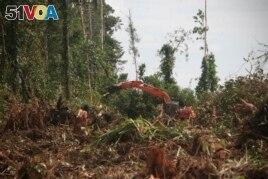02 April 2021
The World Resources Institute (WRI) says the world lost 4.2 million hectares of forest land in 2020.
The total area affected would be about the size of The Netherlands.
The loss of forest in 2020 was a 12 percent increase over 2019.
How deforestation affects climate
Climate change both causes forest loss, or deforestation, and is caused by deforestation. Scientists warn that climate change creates hotter and drier climates. As a result, forests are more vulnerable to fire and damaging insects. Plants are also important because they absorb carbon emissions that are blamed for causing climate change.
Rod Taylor is head of WRI's forest program. He said forests hold large amounts of carbon. Taylor said losing them has "irreversible" effects on biodiversity and the climate.

In this Nov. 27, 2011 photo, a machine clears a forest in Nagan Raya, Aceh province, Indonesia to convert it into a palm oil plantation.
The International Monetary Fund estimates that the world economy shrank by 3.5 percent in 2020 because of the COVID-19 pandemic. But, deforestation continued to increase. The WRI says this was likely because lockdowns limited governments' ability to enforce laws against forest loss. People may have also moved out of cities into rural areas.
However, the strongest effects of COVID-19 on forest loss are probably still to come. WRI researcher Frances Seymour said: "It's likely that governments will try to restart their economies on the backs of forests."
Areas near the Earth's equator lost a total of 12.2 million hectares of forest in 2020. The loss released emissions equal to 570 million cars. That is more than two times the number of cars on the road in the United States.
Brazil saw the largest decrease in forests. The 1.7 million hectares lost was a 25 percent increase from the previous year. The decline was more than three times higher than the next-highest country, the Democratic Republic of the Congo (DRC).
Gains in Indonesia
There was some good news. Indonesia slowed its rate of deforestation by 17 percent in 2020.
Palm oil, a vegetable oil, is a leading driver of deforestation. Last year, the price of palm oil decreased, possibly affecting deforestation in Indonesia.
In addition, experts say the Indonesian government passed laws that are preventing forest loss after damaging fires in 2015. Those rules include fire prevention measures, restrictions on new palm oil farms and reforms aimed at reducing poverty. But experts are concerned now that the price of palm oil is starting to rise again.
"The next two to three years would be the real test" if Indonesia can continue reducing deforestation, said Andika Putraditama, who works with WRI in Indonesia.
WRI experts say that climate change is killing forests in many different ways.
In Europe, hot, dry weather in 2019 and 2020 led to more insect damage in Germany and the Czech Republic. Forest losses increased 200 percent in the two countries from 2018.
In Russia, a hot spring and summer led to forest fires in Siberia.
Extreme heat and drought in Australia is blamed for damaging fires there in 2019 and 2020.
The world is stuck in a "vicious cycle," Seymour said. Global warming leads to dry forests, forest fires and insect damage.
Seymour added: "Nature has been whispering this risk to us for a long time. But now she is shouting."
Mario Ritter Jr.
Steve Baragona reported this story for Voice of America. Dan Novak adapted it for VOA Learning English. Mario Ritter Jr. was the editor.
____________________________________________________________
Words in This Story
vulnerable- adj. easily hurt or harmed physically, mentally, or emotionally
absorb- v. -to take in a natural or gradual way
emissions –n. (often pl.) gasses released from processes like burning fuel
biodiversity –n. the existence of many different kinds of plants and animals in an environment
lockdown –n. an emergency measure of keeping people in a secure place to avoid or prevent danger
irreversible- adj. impossible to change back to a previous condition or state
drought- n.- a long period of time during which there is very little or no rain
vicious- adj.- very violent and cruel
cycle –n. a set of events or actions that happen again and again
whisper- v.- to speak very softly or quietly
We want to hear from you. Write to us in the Comments Section, and visit 51VOA.COM.